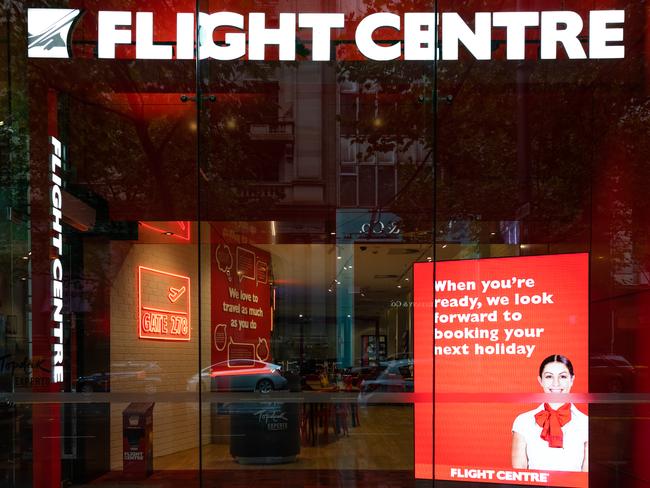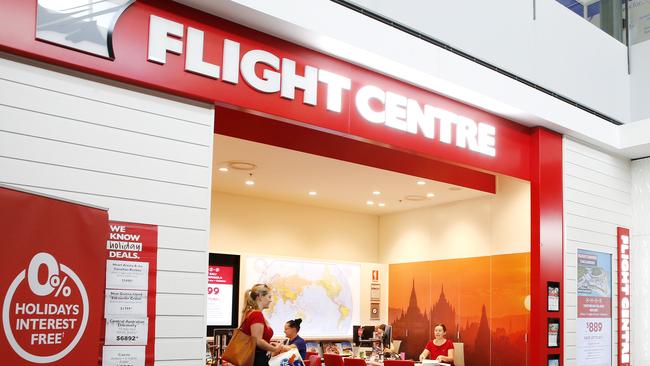Opinion: COVID-19 questions that are not being answered
For us to gauge the long-term feasibility of Queensland’s coronavirus strategy, the Government needs to answer three questions, writes Graham Turner.
The Flight Centre Travel Group business of which I am chief executive officer effectively started in London in 1973 as TopDeck Travel.
We opened the Flight Centre brand in Sydney in 1982, basically providing the Australian public with discounted airfares which until around that time was illegal.
Coronavirus Qld: Why large-scale lockdowns ‘aren’t the answer’
7 must-visit Queensland places to disconnect
Queensland tourism leaders react to decision to shut off Greater Sydney
We floated our business in 1995 on the stockmarket while operating in five countries, although Queensland-based.
Pre-COVID, Flight Centre Travel Group operated in 24 countries, had annual sales of about $24bn and more than 2200 shops and office locations, 22,000 full-time-equivalent employees and profits running of $300 million to $380 million a year.
Our global headquarters is at South Bank, Brisbane, where we had 12 floors and about 1800 people.
Four months after COVID-19 government restrictions really hit Australian businesses, FCTG has only 6000 people working worldwide in less than 1000 locations, doing about 10 per cent of previous sales and losing hundreds of millions of dollars a year.
We are now down to three floors and 600 people in our Brisbane HQ.
Of course we are no different to hundreds of thousands of other Queensland and Australian businesses.
So how do we live with this virus without this economic and lifestyle devastation?
We need to know and understand and believe in our governments’ – state and federal – medium-term objectives and plans to get to those objectives.
We need to understand why lockdowns and border closures are necessary and whether they work.
It appears to me they do not.
Also, how do we live with this virus without large numbers of deaths and the current economic devastation?
We need to understand if vaccines are coming and will they be effective. Knowing why aged care and similar institutions are in such disarray in Victoria and why it won’t happen elsewhere is crucial.
I think governments everywhere are taking too much advice from health officials who are often not experts in epidemiology let alone in economic outcomes of their advice.
It appears most governments take little advice from business and community leaders.
Many billions of dollars have been spent on fixing the issues government restrictions have caused – compensation to business and workers – rather than on preventing the virus spread and protecting vulnerable older people.
The Queensland and New Zealand governments could be congratulated for their early success in the fight against COVID-19.
This fight, however, is by no means won and, in many ways, is only just beginning. It is generally accepted this highly contagious virus cannot yet be eliminated from our region – meaning further outbreaks are inevitable in Australia and NZ, and the social and economic costs related to lockdowns and shut borders will continue to mount astronomically.
As a Queensland-headquartered business, we would love to know what the state government’s longer-term objectives and aspirations are – effectively, the objectives related to COVID-19 for the next 18 months to two years.
If we assume the short-term priority is containment, and that second and third waves are probably inevitable, what comes next and as a business what do we need to be planning for?
I believe there are three key issues to consider.
Firstly, is eradication possible at some geographic level and, if so, at what cost to the Queensland economy?
Secondly, what is the effectiveness – or ineffectiveness – of wide-ranging lockdowns?
In other words, do they work?
Then, is it possible to invest in other important areas and to effectively learn to live with the virus while minimising the health risk?
If we assume a vaccine is some way off – and there may never be one – embarking on an eradication strategy appears to be along and painful journey from both a financial and social perspective.
In Queensland, and in Australia, it is probably impossible unless we are prepared to shut ourselves off from the world for an extended period and we accept the severe economic consequences and other flow-on societal effects associated with this forced shutdown.
New Zealand has had a hard and long lockdown and, at this point, has probably succeeded in eradicating the virus within its borders.
But the obvious questions now are what are the next steps and how long will New Zealand have to wait before it can rejoin COVID-19-free world.
Do the Kiwis wait possibly years for a vaccine – but at least 12 to 20 months – or accidentally face a second wave or be in such dire economic straits that they have no choice but to open up to the rest of the world?
In a country that relies heavily on tourism, as does Queensland, their economy will be a basket case for many years if isolation remains.
The World Health Organisation in their latest scientific paper (July 9) does not mention border closures or community lockdowns as a prevention or control strategy, so why are some states and countries doing it? Why are health officials still recommending this if it is shown not to work?
There is no evidence I can see that widespread community, city or state lockdowns work. Success comes from other strategies – testing, tracing, distancing, mask wearing and community co-operation.
Recently, former president of the Australian Veterinary Association Matt Makin recommended what could be a viable alternative to widespread lockdowns – a small and targeted zonal approach.

Regions are divided into infected, protected, containment and free zones, which is a strategy that is commonly adopted to curb infectious disease outbreaks in the domestic animal world.
This type of model would minimise the effects on employment and business, as well as the community in general.
The zones would need to be as small as possible so effective containment could happen without a lot of disruption.
If large-scale lockdowns are expensive and ineffective, we obviously need to look for other answers as we work to get this virus under some control and flatten the curve.
Business and community input into our political leaders’ strategies is badly needed, rather than the very narrow current approach that appears to focus solely on health officials’ conventional wisdom approach.
Various experts, including some health officials, immunologists and epidemiologists, are now advocating that we learn to live with the virus.
As a business leader, this is the approach we support.

It should not be confused with letting the virus run amok.
On the contrary, it requires carefully thought out strategies to protect the vulnerable, widespread testing and then effective tracing, spending the money on prevention of spread rather than consequences of restrictions and lockdowns that often don’t work.
It also requires open and honest communication from government.
Investment will be required, but this should deliver a better return in the medium to long term if we can find a solution that better balances health and safety concerns with social and economic costs.
Getting our Queensland businesses, particularly in the airline, tourism, events, travel and hospitality industries, up and running normally and re-employing hundreds of thousands of people without incurring huge financial and social costs should be a priority.
We should be developing a unified, Australia-wide plan to reopen borders as soon as Victoria has some level of control.
We need to be able to live with the virus, while ensuring that health and safety remain priorities.

